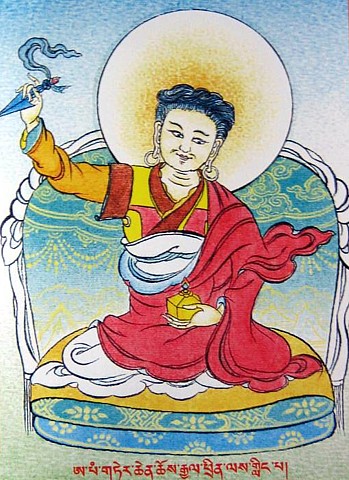Apang Tertön: Difference between revisions
No edit summary |
|||
| (20 intermediate revisions by 5 users not shown) | |||
| Line 1: | Line 1: | ||
[[Image:Apang Terton.jpg|frame|'''Apang Tertön''' courtesy of www.aming.cc]] | [[Image:Apang Terton.jpg|frame|'''Apang Tertön''' courtesy of www.aming.cc]] | ||
'''Apang Tertön''' aka '''Pawo Chöying Dorje''' or '''Orgyen | '''Apang Tertön''' (Tib. ཨ་པཾ་གཏེར་སྟོན་, [[Wyl.]] ''a pang gter ston'') aka '''Apang Terchen''', '''Pawo Chöying Dorje''' (དཔའ་བོ་ཆོས་དབྱིངས་རྡོ་རྗེ་, ''dpa' bo chos dbyings rdo rje''), '''Lhachen Tobgyal''', '''Orgyen Trinlé Lingpa''' (ཨོ་རྒྱན་ཕྲིན་ལས་གླིང་པ་, ''o rgyan phrin las gling pa'') or '''Orgyen Drodul Lingpa''' (1895-1945) — was a great [[tertön]] whose body could pass through solid objects and who discovered many [[terma]] teachings, and one of [[Dudjom Lingpa]]'s miraculously conceived sons. | ||
==Birth & Family== | |||
According to oral tradition, Apang Tertön’s conception was miraculous. Through the concentration of Dudjom Lingpa’s wisdom mind, the child was conceived from afar in his mother’s womb, who happened to be a nun with pure vows. | |||
Apang Tertön was considered to be the reincarnation of [[Rigdzin Gödem]] and of Zhichen Tulku Rinpoche. | |||
==Training== | |||
At age eight, Apang Tertön was taken to [[Katok Monastery]] and enthroned as the reincarnation of Zhichen Tulku Rinpoche. | |||
==Activity== | |||
Apang Tertön came from [[Golok]] and his practices spread throughout Tibet. The main holder of his teachings was his daughter [[Tare Lhamo]] (1938-2003), as well as his three sons; the [[chödak|custodian of his termas]] was [[Changchub Dorje]]. He was also a root guru of [[Dodrupchen Rinpoche]]. | |||
==Reincarnation== | |||
Apang Tertön’s death was as extraordinary as his conception. Announcing his intention to help the [[Sakya]] lineage, he passed away deliberately and reincarnated as [[Sakya Trizin]] who for many years was the throne holder of the Sakya tradition. | |||
==Further Reading== | |||
*[[Nyoshul Khenpo]], ''[[A Marvelous Garland of Rare Gems]]: Biographies of Masters of Awareness in the Dzogchen Lineage'' (Padma Publications, 2005), pages 488-491. | |||
==Internal Links== | |||
*[[Dudjom Lingpa Family Lineage]] | |||
==External Links== | |||
*{{TBRC|P6489|TBRC profile}} | |||
[[Category:Nyingma Masters]] | [[Category:Nyingma Masters]] | ||
[[Category:Longchen Nyingtik Masters]] | |||
[[Category: Dudjom Tersar Masters]] | |||
[[Category:Tertöns]] | [[Category:Tertöns]] | ||
Latest revision as of 16:35, 24 June 2022

Apang Tertön (Tib. ཨ་པཾ་གཏེར་སྟོན་, Wyl. a pang gter ston) aka Apang Terchen, Pawo Chöying Dorje (དཔའ་བོ་ཆོས་དབྱིངས་རྡོ་རྗེ་, dpa' bo chos dbyings rdo rje), Lhachen Tobgyal, Orgyen Trinlé Lingpa (ཨོ་རྒྱན་ཕྲིན་ལས་གླིང་པ་, o rgyan phrin las gling pa) or Orgyen Drodul Lingpa (1895-1945) — was a great tertön whose body could pass through solid objects and who discovered many terma teachings, and one of Dudjom Lingpa's miraculously conceived sons.
Birth & Family
According to oral tradition, Apang Tertön’s conception was miraculous. Through the concentration of Dudjom Lingpa’s wisdom mind, the child was conceived from afar in his mother’s womb, who happened to be a nun with pure vows.
Apang Tertön was considered to be the reincarnation of Rigdzin Gödem and of Zhichen Tulku Rinpoche.
Training
At age eight, Apang Tertön was taken to Katok Monastery and enthroned as the reincarnation of Zhichen Tulku Rinpoche.
Activity
Apang Tertön came from Golok and his practices spread throughout Tibet. The main holder of his teachings was his daughter Tare Lhamo (1938-2003), as well as his three sons; the custodian of his termas was Changchub Dorje. He was also a root guru of Dodrupchen Rinpoche.
Reincarnation
Apang Tertön’s death was as extraordinary as his conception. Announcing his intention to help the Sakya lineage, he passed away deliberately and reincarnated as Sakya Trizin who for many years was the throne holder of the Sakya tradition.
Further Reading
- Nyoshul Khenpo, A Marvelous Garland of Rare Gems: Biographies of Masters of Awareness in the Dzogchen Lineage (Padma Publications, 2005), pages 488-491.